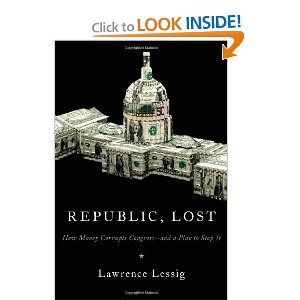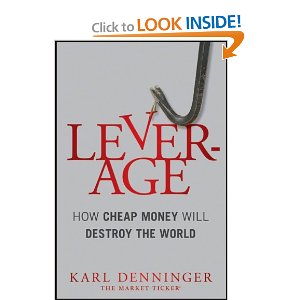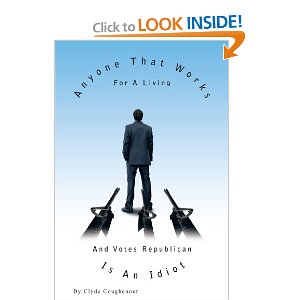
Lawrence Lessig
5.0 out of 5 stars Diplomatically Provocative — A Foundation, Not a Structure, March 22, 2012
I come late to this book but my review will be much more detailed and useful than most others now posted, including the several that I voted for. I received it this afternoon and it has absorbed me every since.
As someone who ran for the Reform Party nomination for President with the specific intent of putting all the good ideas in one place (BigBatUSA (org), and who also tried to get Occupy to understand that electoral reform was the one thing that would make them central to all stakeholders, allow them to raise money from a broader coalition, and flush Congress down the toilet, I have three contextual disagreements that I place at the end of this review. In no way do they detract from this specific work that does what it set out to do.
The highest praise I can give this book is that I found it engrossing and learned from it. Gary North has done a great job in his article at featured at Phi Beta Iota the Public Intelligence Blog, “Administrative Law (New World Order) versus Democracy (Live Free or Die).” What I learned from this author is that administrative regulations are how Congress creates its “protection racket” and manipulates conditions so that those who gain ($1 in lobbying yields $6 to $20 in government earmarked pork) have to “give” every year.
From start to finish this book provokes me. As a professional intelligence officer who has been fighting since 1988 for a Smart Nation and a Whole of Government decision-support capacity that is not secret, not expensive, and not obsessed with contrived threats to the detriment of opportunities to create a world that works for all, I love the following:
QUOTE (1): Government is an embarrassment It has lost the capacity to make the most essential decisions.”
That is of course because all of government is corrupt — the Cabinet officers are there to protect budget share and serve the recipients of the taxpayer dollar, not to serve the taxpayer — the President is a puppet, all theater, today with a nanny from Goldman Sachs installed as “National Security Advisor.” The Supreme Court, thanks to Lewis Powell, is equally corrupt — the author is too kind to them in this book, while offering some very deep criticism of Justice Kennedy and CITIZENS UNITED.
MUCH later in the book, on page 247, the author relates the Jon Stewart – Bill O'Reilly exchange that got him started on this book, I would have liked it up front so I offer it here with a strong recommendation to buy this book because as these two neo-toxic opponents were quick to agree, corruption is at the heart of all these problems. I will give them the benefit of the intellectual doubt and hope they mean a lack of integrity — I consider lies to be corruption, and all forms of deception and propaganda and misinformation to be sand in the gears of an extraordinarily complex delicate system of systems. You can look for my posting on this topic, “Journal: Reflections on Integrity UPDATED + Integrity RECAP” and see especially the first two earlier postings cited there.
Mindful of Amazon's quote limit, here is the heart of the book:
QUOTE (7): The greatest threat today is in plain sight. It is the economy of influence now transparent to all, which has normalized a process that draws our democracy away from the will of the people.
The bulk of the first third of the books explores the twin outcomes, bad governance and lost trust, and the three corruptions: the author's articulation of “dependency corruption” that is in turn the foundation for very limited “venal corruption” (direct bribery) and pervasive “systemic corruption” where a “gift economy” and implied obligations destroy the integrity of the government across all topics.
The author offers examples that lead to the conclusion that government cannot be trusted to keep products safe. I know from many other readings that the USA is now considered a dumping ground for products not allowed in Europe; that the government is creating ceilings for state regulation instead of floors especially with respect to environmental responsibility (were I a governor, I would be nullifying at least half the regulations, most written by mega-industries intent on putting small town butchers and others out of business); and that the government is completely lacking in decision support across the board. The US Intelligence Community spends $80 billion a year in corporate welfare, and this produces, according to General Tony Zinni, USMC (Ret), then Combatant Commander of US Central Command, “at best” 4% of what he needed to know. [Disclosure: I helped create the Marine Corps Intelligence Center precisely because nothing the national or other service centers did was useful to a force specializing in expeditionary operations. This is when I realized — and subsequently testified and proved to the Aspin-Brown Commission — that there is nothing in the secret data bases useful to 90% of our needs.]
I love the author's brief but point examination of the role that money plays in distorting conclusions across a range of industries. When industry pays, the information is severely constipated. When independent efforts are undertaken, the results are severely critical. There is no think tank, anywhere, that I consider to be completely honest or capable, and I share Derek Bok's concerns in Universities in the Marketplace: The Commercialization of Higher Education.
About halfway through the book I have a note that this is a subtle graceful book. The author is adroit at stating ugly facts in a beautiful way. He emphasizes the value of trust, which I also emphasize in my next book, and points out that when addressing systemic corruption it is not about the absolute good or absolute bad, but about all the gray shades of bad in-between.
Bad Policy + Lost Trust = Republic Lost
He articulates the importance of clarity, diversity, and integrity (most of the subtitle of my last book) in stressing that none of us are expert at all things or even anything, and we have to be able to trust something — presumably government — to do the due diligence. Now that he is at Harvard, I imagine he is talking more with one of my own favorite authors, David Weinberger, whose latest book is all about this point: Too Big to Know: Rethinking Knowledge Now That the Facts Aren't the Facts, Experts Are Everywhere, and the Smartest Person in the Room Is the Room.
The author's discussion of the financial ruin that Congress is bringing upon us all is illuminating. With all my reading, there is stuff here I did not know and do appreciate. Especially enlightening to me is a much deeper survey of not only how much we do in the way of subsidizing bad business that externalizes diseconomies to the public, but how FEW are the beneficiaries. The author points out that the 1% are essentially poor businessmen who have figured out how to harvest the public treasury by bribing the US Government.
A number of charts are offered throughout the book, and I like them very much. Two of these charts make the point that anti-reformers outspend reformers by 10 to 1. With respect to the financial derivatives crash, the author names names: Mark C. Brickell, Phil Gramm, Bill Clinton, and Alan Greenspan. He does not mention the Secretary of the Treasury (owned by Goldman Sachs for the last several administrations) or the Office of Management and Budget which has not known how to manage anything for a very long time.
I really like the author's bottom line and how he clearly places the responsibility on government (too little and totally lax regulation) combined with promised bailouts from the Fed and Treasury. He also explores how New York members of Congress such as Charles Schumer came to represent Wall Street. What this really means — and Joe Markowitz, one of the few minds still in government for whom I have absolute respect has said this before — is that contractors do what the government incentivizes them to do. While this does not excuse the high crimes of the financial industry, it does place the blame where it belongs: corrupt government.
Here is an astonishing fact from this book (page 83): Financial Services spend more to lobby congress and contributed more to Senate and House campaigns thatn the COMBINATION of those spending for energy, health, defense, and telecommunications.
He cites a good member of Congress, Jim Leach from Iowa, using his honest service as an example of the good that comes from NOT taking money from those you are supposed to be helping to govern. Indeed, the author stuns me in citing Dennis Thompson to the effect that Congress today is among the least corrupt Congresses in history. I find this very hard to believe given the inability to stop borrowing money we cannot pay back. I know for a fact, from Hill staff, that the standard payback for an earmark is 5%, and that the earmarks have not been eliminated, they are just hidden now in “defense support.” Evil triumphs when silence enables it.
The fall of Congress is traced by the author in part to Lyndon Johnson's going for broke on civil rights, which split the Democratic Party, and Newt Gingrich's success in raising money to take over Congress and then destroy Speaker Wright, a long sad story told in The Ambition and the Power: The Fall of Jim Wright : A True Story of Washington. It is Newt Gingrich that destroyed bi-partisanship and turned Congress into foot-soldiers for the President, which is, by the way, treason. It is the root cause of Congressional abdication of its Article 1 responsibilities. To abdicate a prescribed Constitutional responsibility is treason, in my view. Other books on the fall of Congress include Senator Coburn's Breach of Trust: How Washington Turns Outsiders Into Insiders and The Broken Branch: How Congress Is Failing America and How to Get It Back on Track (Institutions of American Democracy).
To understand the failure of Congress one must understand the corruption of the two-party tyranny, something not addressed at all by this book, for those insights I recommend Peter Peterson's Running on Empty: How the Democratic and Republican Parties Are Bankrupting Our Future and What Americans Can Do About It and Theresa Amato's Grand Illusion: The Myth of Voter Choice in a Two-Party Tyranny. I honor her by adopting her sub-title, never mind the angst it causes those who prefer fairy tales. Obama was elected by 30% of those voting, 56.4% of the eligible voters. A TEAM of Independents and excluded parties could still win in 2012, but only if we all come together in an Electoral Reform Summit that also creates a coalition cabinet in which each of the presidential candidates agrees to abide by public choice as crowd-sourcing blesses the final slate just prior to election day.
I learn that in the period up to 2004 50% of retiring Senators and 42% of retiring Representatives migrated to K Street as lobbyists. The author makes the point that apart from the systemic corruption associated with campaign finance, there is now the revolving door corruption, in which Congressmen act in Congress in such a manner as to “qualify” for “promotion” to K Street. Sickening.
As the author moves toward solutions, I am taken by his articulation of the Founding Fathers' intent in establishing checks and balances and INDEPENDENCE among the elements of government, precisely to avoid any dependency OTHER THAN on the will of the people. I am charmed by the phrase on page 130 “sophisticated constitutional architects.”
I will not summarize a very strong section on how money and systemic corruption destroy good governance, the author addresses:
01 Distraction from duty
02 Distortion of agenda
03 Lost trust of the public
Between charts and text I am fascinated to learn that Congress uses Administrative Law to extort funds from those affected. This is the flip side of how the extreme rich in the USA become so by manipulating changes in government policy (the KEYSTONE pipeline is criminally insane at multiple levels, including use of water to flush tar sands, external diseconomies running the length of the pipeline, and the aged legacy refineries being used to create products for EXPORT. We have more than enough energy in the USA, this is a rip off and Obama has sealed his servant status with his recent support for this anti-public project.
Discussing CITIZENS UNITED I am surprised to learn that the Supreme Court had a leg to stand on, the First Amendment does not speak to freedom of speech for *people* only to freedom of speech, but the author then dismantles Justice Kennedy for confusing contributors with voters, and points out that chasing contributions is completely different from chasing voters.
QUOTE (247): Our Congress is politically bankrupt.
To which I would add, and so is everything else in this country, including universities, charities, foundations, labor unions, and law enforcement, the latter prostituting itself for counter-terror funding while Mayors neglect everything else — just today the news is out that cities across America are prohibiting the feeding of the homeless.
Buy the book to understand the solutions the author proposes. I like the democracy voucher but government should not administer it (just as I am now worried about government hijacking IRAs as collateral on debt). Imagine 100 million voters giving $10 each to BigBatUSA, whose purpose is to fund a coalition cabinet and balanced budget announced in advance of election day. Game over.
QUOTE (269): We have corporate welfare because we have privately funded elections.
The author really renders a service in pointing out that $3 billion a year spent to fund honest open elections would allow for the elimination of over $90 billion in corporate welfare (I think the total is closer to one trillion including agriculture, energy, defense, intelligence, and homeland “security”).
Some of his strategies intersect with mine, but I believe mine [because I have drawn on Jim Turner (#2 to Nader for many years and much more personable), Mike Cudahey (key aide to Barry Goldwater), Jock Gill (communications specialist for Bill Clinton) and many others], are more comprehensive and coherent. I must mention that my solution called for Ron Paul, Dennis Kucinich, Rocky Anderson, Jill Stein, Gary Johnson, and Buddy Roemer to all agree to support an Electoral Reform Summit at which we would also announce that we were all running as a TEAM, with a publicly validated ticket and coalition cabinet and balanced budget announced in advance of election day. Rocky Anderson had the grace to call me, but all of the others were like deer in the headlights — beyond their ego trips, for sure. I am thinking about posting my letters (in my former status as a Reform Party candidate) to all of them — clay feet to the man and woman.
The author has been championing a Constitutional Convention for some time, and while I think it is a bridge too far, and the Electoral Reform Act of 2012 with its eleven crowd-sourced points is more than ample for cleaning house, I totally enjoy this section of the book and especially appreciate his naming several “good rich:” Arnold Hiatt, Alan Hassenfeld, Jerry Kohlberg, Edgar Bronfman Jr., and Vin Ryan; his mentioning that the greatest fear when he speaks about this is the fear of public ignorance; and his recounting of how Google under Eric Schmidt has blown it, refusing to use its powers to empower the public. [I am a huge critic of Google, as I am of Microsoft — Google is math hacks on digital garbage, Microsoft is second rate buggy heavy software long over due for being thrown out, as the universities in India have just done — they are going open source everything, and just in time.] My graphic of what Microsoft could have done to rise like a pheonix reached the new CTO who blew it off, it can be easily found by searching for < Graphic: One Vision for the Future of Microsoft >.
The author speaks briefly to the Constitutional Convention being randomly selected citizens. In support of that I suggest the reader search Amazon for books on appreciative inquiry, deliberative dialog, and collective intelligence, but I especially recommend Tom Atlee's The Tao of Democracy: Using co-intelligence to create a world that works for all, Jim Rough's Society's Breakthrough!: Releasing Essential Wisdom and Virtue in All the People, and Kevin O'Keefe's The Average American: The Extraordinary Search for the Nation's Most Ordinary Citizen.
The book ends with 42 pages of notes — this is not an opinion piece, it is a scholarly work — and I learn for the first time about WebCitation (org).
Below are three contextual disagreements I have with the author, and hope that one day we might be together at a round table. This book made my day. This book deals with reality, is authentic, and is very much in the public service.
Robert Steele
THE OPEN SOURCE EVERYTHING MANIFESTO: Transparency, Truth & Trust
First disagreement: getting money out of politics means nothing if the two-party tyranny continues to block ballot access, use gerrymandering to pick its voters, engage in ballot fraud across all fronts, undermine the Electoral College with “winner take all” hijackings of losing candidate delegates, and so on. We need an Electoral Reform Act of 2012. Watered down versions of this act have been introduced nine times, four of those times by Ron Paul. Congress has the power to demand that all states put all accredited national parties (there are eight: Constitution, Democratic, Green, Libertarian, Natural Law, Reform, Republican, and Socialist) on all state ballots for FEDERAL offices; and that candidates from all parties be included in all debates regardless of who is sponsoring the debate — if it is federal, it must be inclusive.
Second disagreement: to expect Congress (as now monopolized by a two-party tyranny driven by fund-raising and control of access to the public purse including the unconstitutional act of borrowing one third of the federal budget and creating an Administrative Law state that micro-manages what it does not understand in order to extort funds from those affects) to do anything in the public interest, is in my view delusional. Occupy had Congress worried for a couple of months but Occupy blew it. Had they occupied every Congressional home office over the holidays and demanded the Electoral Reform Act of 2012, they could have formed a public majority and accomplished far more than this author imagines in this book. But they did not.
Third disagreement: Systemic corruption — the author's signal contribution discussed throughout the book — pervades all elements of the USA. We have become a The Cheating Culture: Why More Americans Are Doing Wrong to Get Ahead as David Callahan describes it so well. I wrote “Paradigms of Failure” as a preface to one of my books, it can be found free online. There are eight major intellectual “tribes” in the USA and around the world: academic, civil society, commerce, government, law enforcement, media, military, and non-governmental/non-profit. Every single one of them is corrupt, lacking in integrity (my definition is the holistic one, I agree with the author that systemic corruption embraces good people trapped in a bad system).








